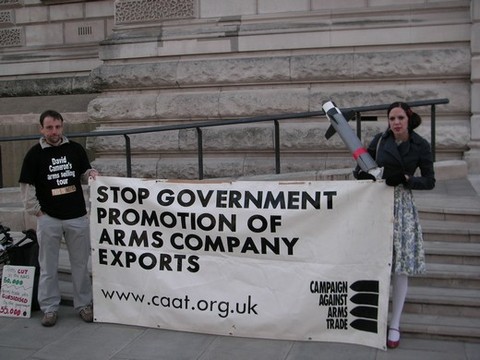UK Export Finance (UKEF), known until November 2011 as the Export Credits Guarantee Department (ECGD), is aligned with the Department for International Trade. It guarantees that companies and banks involved in an export deal will not lose out if the overseas buyer does not pay, or makes late payments. Companies are charged a premium and UK Export Finance aims to break even, but any shortfall comes from the UK tax-payer.
Export credits and arms exports
The arms companies have benefitted more than any other from export credit guarantees. This is even though arms account for just 1.5% of total UK exports. Export credit support does, though, vary considerably from year to year depending on whether or not a major military sale has occurred. It was at its highest, at 57%, at 2007-8 and its lowest at 1% in 2008-9.
In the most recent figures, 2018-19 46% of UKEF’s liabilities were for military exports. In that year, a record £5 billion support was given to support the sale of military aircraft to Qatar, in spite of a letter from UKEF’s Chief Accounting Officer warning that this breached normal risk limits. The deal went ahead when International Trade Secretary Liam Fox ordered UKEF to provide the support.
Debt
Sometimes the purchasers do not pay.In October 2012 UKEF published information on Sovereign Debt. This showed debts for military equipment and projects owed by Mubarak’s Eygpt, Galtieri’s Argentina and Saddam Hussein’s Iraq.
Corruption
In May 2004, the ECGD introduced tough anti-bribery procedures in an attempt to make sure that projects it supported were not tainted by corruption. However, following lobbying by BAE and engine maker Rolls-Royce, these procedures were weakened in December 2004.
After a legal challenge by anti-corruption group, The Corner House, the Government agreed in January 2005 to hold a public consultation over the proposals. As a result, the ECGD reintroduced key anti-corruption measures in July 2006, including a requirement on exporters to name agents involved in the transaction. In March 2010, the Labour government relaxed the procedures where the application to the ECGD was one to a number of different national Export Credit Agencies.
The ECGD came in for considerable criticism in the OECD’s October 2008 report into the UK (PDF), which followed from the Government’s December 2006 decision to stop the Serious Fraud Office inquiry into BAE’s Saudi deals. The report said that the SFO had handed the ECGD evidence of misrepresentations by BAE to the ECGD in connection with the issuance of insurance, but that the ECGD had done nothing about it. The OECD also raised questions about ECGD support where the recipient of the underwritten goods had interfered with criminal law proceedings as Saudi Arabia had done with the SFO inquiry.
Not only in the UK …
About 40 other countries have an Export Credit Agency (ECA), including every major industrialised country. The exact roles and structures vary, but even where the ECA itself is private, as is the case with COFACE in France, there is state backing and guarantees. The extent to which other ECAs support arms exports varies, largely in parallel with the importance of the country’s arms export industry.

